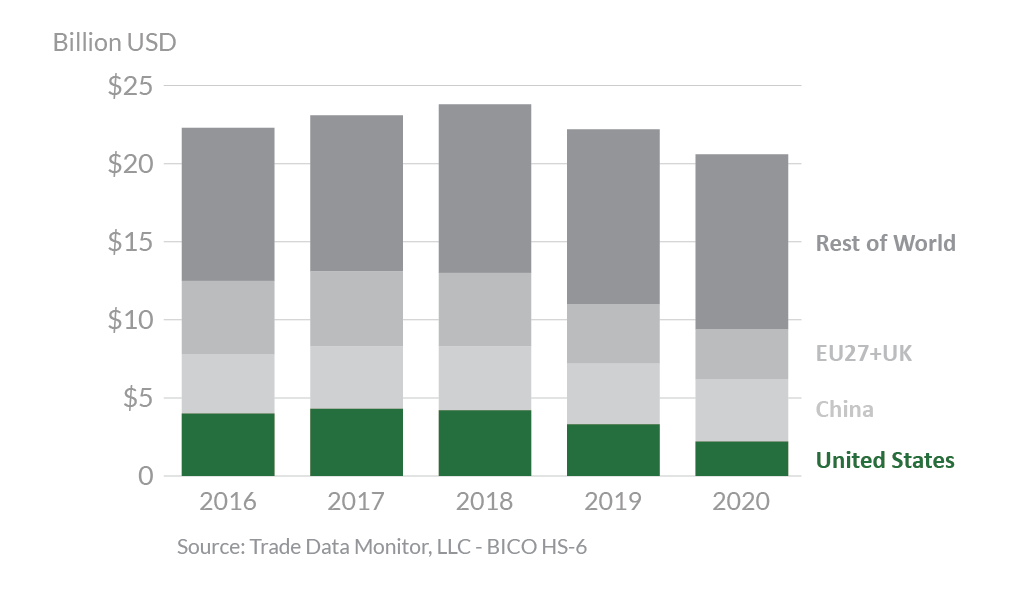
Hong Kong 2020 Export Highlights
Top 10 U.S. Agricultural Exports to Hong Kong(values in million USD) |
|||||||
| Commodity | 2016 | 2017 | 2018 | 2019 | 2020 | 2019-2020 % Change | 2016-2020 Average |
| Beef & Beef Products | 684 | 884 | 964 | 746 | 666 | -11% | 789 |
| Tree Nuts | 1,156 | 1,251 | 1,052 | 692 | 271 | -61% | 884 |
| Prepared Food | 232 | 169 | 228 | 191 | 186 | -3% | 201 |
| Fresh Fruit | 281 | 291 | 237 | 194 | 181 | -7% | 237 |
| Poultry Meat & Products* | 426 | 469 | 431 | 353 | 107 | -70% | 357 |
| Pork & Pork Products | 360 | 415 | 282 | 154 | 91 | -41% | 260 |
| Dog & Cat Food | 40 | 50 | 62 | 57 | 68 | 21% | 55 |
| Wine & Beer | 101 | 120 | 131 | 114 | 65 | -43% | 106 |
| Processed Vegetables | 54 | 49 | 53 | 54 | 42 | -21% | 50 |
| Eggs & Products | 39 | 38 | 46 | 46 | 39 | -15% | 42 |
| All Other | 459 | 477 | 473 | 391 | 302 | -23% | 422 |
| Total Exported | 3,832 | 4,213 | 3,959 | 2,992 | 2,018 | -33% | 3,403 |
Source: U.S. Census Bureau Trade Data - BICO HS-10
*Excludes eggs
Highlights
In 2020, Hong Kong was the 12th largest destination for U.S. food and agricultural exports, totaling $2 billion. This represents a 33-percent decrease from 2019. In 2020, Hong Kong also remained the sixth-largest market for consumer-oriented agricultural exports, valued at more than $1.8 billion, or 86 percent of U.S. agricultural exports to Hong Kong. The United States was the third-largest supplier of agricultural goods with 11 percent market share, behind China with 19 percent and the EU27+UK with 16 percent. The downward export trend to Hong Kong in 2020 was largely due to travel constraints in reaction to the global outbreak of COVID-19. Additionally, an increase in direct U.S. agricultural exports to China reduced the frequency of transshipment through Hong Kong, resulting in a decrease in U.S. agricultural exports to Hong Kong. Hong Kong is the fifth-largest export market for U.S. beef at more than $665 million, the sixth-largest market for fresh fruit at $180 million, the seventh-largest market for wine at $64 million, and the seventh-largest market for fish products at $123 million. Among the few products that saw increases to Hong Kong in 2020 were dog & cat food and cotton, which grew $11 million and $3 million, or 21 and 58 percent, respectively. Exports of poultry meat & products (excluding eggs), beef & beef products, and pork & pork products fell last year by $246 million, $80 million, and $63 million, respectively.
Drivers
- In January 2020, Hong Kong was one of the first places outside of China to confirm cases of COVID-19. The Hong Kong Government has implemented stringent measures to control the spread of the coronavirus, effectively shutting down the critical leisure tourism sector. Prior to the pandemic, Hong Kong was the most visited destination in the world, fueling the demand for high-value U.S. agricultural exports for the hospitality industry.
- While the sales of premium products to the Hotel, Restaurant, and Institutional food service sector have been adversely affected, retail sales of food products in supermarkets have increased as people cook at home more as a result of public health measures.
- Direct U.S. agricultural exports to mainland China increased, decreasing the likelihood of transshipment of goods through Hong Kong.
Hong Kong’s Agricultural Suppliers

Looking Ahead
Hong Kong will continue to be an important market for U.S. agricultural and food exports, free from tariffs and taxes. More than 95 percent of Hong Kong’s food supplies are imported, and U.S. products are well received by Hong Kong consumers because of enforceable U.S. food safety standards and the consistent quality of U.S. products. While ongoing political tensions may reduce Hong Kong’s desirability as a business center for international companies, the jurisdiction, as a free port that allows for the free flow of goods and capital, continues to play an important role in introducing and establishing U.S. products for the larger Asian market. As Hong Kong and the broader global economy emerge from the coronavirus pandemic, U.S. agricultural exports should be able to recover some lost ground in Hong Kong.
